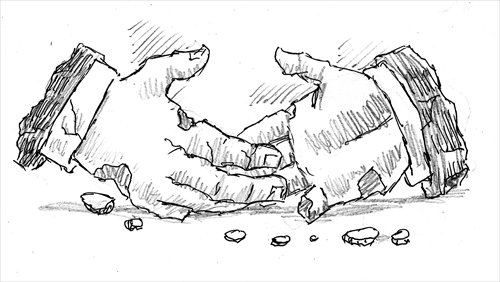China must respond to challenge from TPP
TPP and RCEP could merge into Asia-Pacific free trade zone

Illustration: Peter C. Espina/GT
Last Friday saw the failure of ministers from the 12-nation Trans-Pacific Partnership (TPP) to clinch a deal in Hawaii. However, that does not give China reason to heave a sigh of relief.
The key issues that prevented TPP members from sealing the deal include market access for dairy and sugar products and intellectual property rights for new generations of medical products. But these issues are negligible and will definitely not obstruct the progress of the TPP, so agreement on it is only a matter of time.
China needs to consider how to address the challenges the TPP might bring, and there are likely to be two main areas. First, China will lose the opportunity to get involved in formulating the new generation of international trade rules, which will override WTO rules. The US is engaged in constructing these new rules through negotiations on the TPP, as well as the Transatlantic Trade and Investment Partnership (TTIP) and the Trade in Services Agreement (TiSA).
The new rules involve a wide range of issues, including services trade, protection of intellectual property rights, labor and environment protection, state-owned enterprise subsidies, government procurement and dispute settlement. Each of these represents a weak point for China, and since China has been excluded from negotiations on the three agreements, it will have no voice in formulating the new round of international trade rules.
Second, the TPP negotiations will lead to massive migration of trade and investment activities in Asia-Pacific. Due to the rise in labor costs in China, a number of foreign investments have already moved to other developing countries. The impact of market integration brought by the TPP will likely further cause investment that used to come to China to flow to countries such as Malaysia, the Philippines, Vietnam and Mexico instead.
Moreover, the effect of strengthened economic cooperation through the TPP could spill over to the political arena, which could cause China to become isolated in terms of Asia-Pacific geopolitics.
China should address the challenges brought by the TPP by adopting a more confident and active diplomatic posture. China signed high-level free trade agreements with South Korea and Australia in June, boosting China's confidence in adopting more active trade strategies in Asia-Pacific.
China is also playing a prominent role in progress toward an Asia-Pacific free trade zone.
There are several ways in which an Asia-Pacific free trade zone could be created. First, the TPP could expand into a broader Asia-Pacific free trade zone. Second, the Regional Comprehensive Economic Partnership (RCEP) could be expanded into an Asia-Pacific free trade zone. Third, the TPP and RCEP could merge into a free trade zone for the Asia-Pacific region.
For China, the first scenario would be the worst, because it would mean that China can only passively accept the TPP rules and would certainly pay a high price. The second path is the best option for China, but also the least likely. China should try its best to ensure that APEC members choose the third option.
This would allow China and other non-TPP members to be equally involved in building the Asia-Pacific free trade zone.
In order to make the third path viable, China should step up efforts to encourage RCEP members to wrap up negotiations at the end of 2015 as scheduled. Only in this way can RCEP members be in the best position to engage in equal talks with TPP members next year, in order to eventually realize integration of the two large free trade zones and establish an integrated Asia-Pacific free trade zone. During this process, China should be more determined to engage in economic reforms so as to embrace a more open economy in the future.
The author is an associate professor at the School of International Studies at the Renmin University of China. He is also a research fellow at the Chongyang Institute for Financial Studies at the Renmin University of China. bizopinion@globaltimes.com.cn